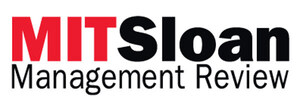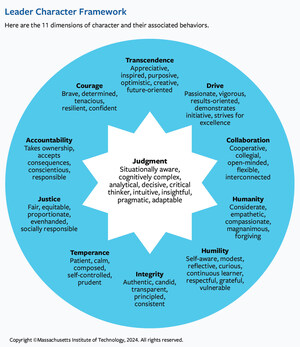CAMBRIDGE, Mass., Jan. 26, 2021 /PRNewswire/ -- A new study released today by MIT Sloan Management Review and Cognizant reveals that many business leaders worldwide are out of touch with what it takes to lead effectively in the digital economy. Employees expect digital transformation to better reflect and respect their concerns, such as purpose and inclusion, just as well as ensuring superior business capabilities, better compensation, and greater flexibility. For example, 72% of survey respondents strongly agree it is very important they work for an organization with a purpose they believe in, but a mere 25% strongly agree that their organizations are as purpose-driven as their leaders believe them to be.
The report, "Leadership's Digital Transformation: Leading Purposefully in an Era of Context Collapse,"is based on a global survey of nearly 4,300 employees, from non-managers to CEOs, in more than 20 industries. The study features interviews with C-suite leaders, including Starbucks CEO Kevin Johnson; Anheuser-Busch InBev (AB InBev) CEO Carlos Brito; Delta Air Lines CEO Ed Bastian; former Best Buy chairman and CEO Hubert Joly; and Purdue University president Mitch Daniels.
"The study strongly suggests many leaders and organizations got digital transformation wrong," says report coauthor Michael Schrage of the MIT Sloan Initiative on the Digital Economy. "For quite a few respondents, top management's focus on greater agility and efficiency seemed disconnected from enterprise purpose and values. Leaders frequently came off as unaware of how their digital communications style undermined their credibility. Digital talent and digital networks have made leadership more transparent, and this study observes that transparency imposes new accountability and responsibility on top management."
The study reveals four key insights:
1. Organizations are not offering workers the sense of purpose they crave.
- 72% of respondents strongly agree it is very important to them to work for an organization with a purpose in which they believe. Still, only 49% strongly say that they believe in their organization's purpose. Even fewer (36%) strongly agree that they believe in their organization's ability to advance its purpose, and a mere 25% strongly agree that their organizations are as purpose-driven as their leaders believe them to be.
2. Organizations with a clear purpose outperform their peers when it comes to diversity and inclusion practices.
- 64% of respondents affirm that top management is prioritizing diversity and inclusion practices. Respondents from highly purpose-driven organizations agree at a higher rate of 84%.
3. Leaders are also failing to invest in and develop their digital competencies.
- While 93% of respondents say being digitally savvy is essential to performing well, and 88% state that digitally savvy leaders matter to their organization's ability to succeed, only a fifth of respondents strongly agree their leaders have the right mindset to thrive in the digital economy.
4. Most companies fail to adequately address the erosion of work/home boundaries.
- Only 36% of global survey respondents say they establish a hard line between when they are working and when they are not.
- Only 28% of respondents agree their organization has policies about when and how to communicate outside traditional business hours, and fewer (24%) agree that their organization adheres to these policies if they do exist.
The authors identify context collapse — the pervasive social media phenomenon that collapses people's multiple identities into one — as a digital disruptor of legacy leadership practices. As boundaries dissolve between work and home, for example, how leaders digitally lead by example will determine their credibility, authenticity, and influence with their talent, the authors say.
"Our study showed that context collapse means leaders are now more accountable — and must be more transparent — than ever before," said report coauthor Benjamin Pring, director of Cognizant's Center for the Future of Work. "Leaders must recognize and respond to this new reality."
"Leadership's Digital Transformation" offers practical and actionable recommendations for successfully leading beyond digital transformation and outlines how leaders can: champion purpose to be a (re)organizing principle; lead by example; leverage context collapse; measure their leadership effectiveness; and analyze leadership networks to improve culture.
To read the full report, please visit MIT Sloan Management Review.
MEDIA CONTACT:
Jennifer Grady Burgos
[email protected]
617-324-2434
Mariana Gámez
[email protected]
+44 78-801-378-71
About the Authors
Michael Schrage is a research fellow at the MIT Sloan School of Management's Initiative on the Digital Economy, where he does research and advisory work on how digital media transforms agency, human capital, and innovation.
Benjamin Pring is vice president, head of thought leadership, and cofounder of the Center for the Future of Work at Cognizant. He was a Bilderberg Meeting participant in 2018 and was named one of the world's top management thinkers by Thinkers50 in 2020.
David Kiron is the editorial director of MIT Sloan Management Review and leads the publication's Big Ideas program, a content platform examining macrotrends that are transforming the practice of management.
Desmond Dickerson is a manager in Cognizant's Center for the Future of Work. Leveraging his experience in digital transformation, he consults with clients on optimizing digital strategies that prioritize user experience and engagement.
About MIT Sloan Management Review
At MIT Sloan Management Review (MIT SMR), we share with our readers an excitement and curiosity about how the practice of management is transforming in the digital age. Our expert contributors help leaders explore the trends that are shaping how organizations operate, compete, and create value in a technology-fueled world. We deliver the kind of evidence-based analysis and practical insight that will inspire leaders to do great work.
About Cognizant
Cognizant is one of the world's leading professional services companies, transforming clients' business, operating, and technology models for the digital era. Our unique industry-based, consultative approach helps clients envision, build, and run more innovative and efficient businesses. Headquartered in the U.S., Cognizant is ranked 194 on the Fortune 500 and is consistently listed among the most admired companies in the world. Learn how Cognizant helps clients lead with digital at www.cognizant.com or follow us @cognizant.
SOURCE MIT Sloan Management Review

Related Links
WANT YOUR COMPANY'S NEWS FEATURED ON PRNEWSWIRE.COM?
Newsrooms &
Influencers
Digital Media
Outlets
Journalists
Opted In





Share this article